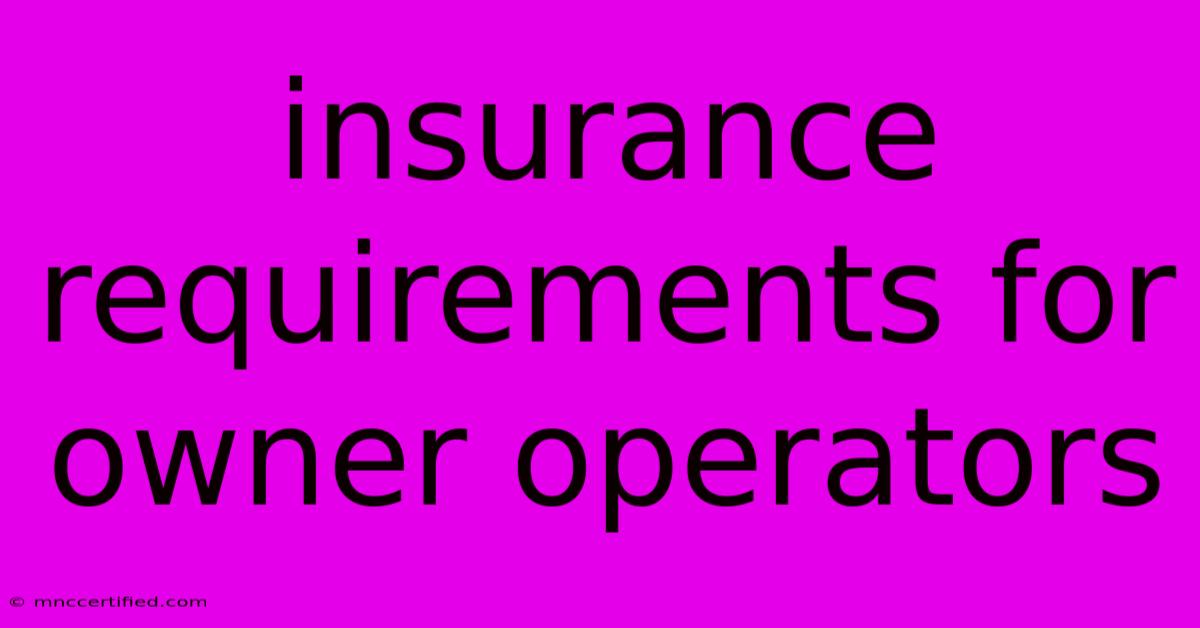Insurance Requirements For Owner Operators

Table of Contents
Navigating the Road: Insurance Requirements for Owner-Operators
Being an owner-operator offers the freedom to be your own boss and chart your own course, but it also comes with a unique set of responsibilities, particularly when it comes to insurance. Navigating the complex world of insurance requirements for owner-operators can seem daunting, but understanding the basics and knowing what to look for can help you secure the right coverage and keep your business rolling.
Essential Insurance for Owner-Operators
1. Commercial Auto Insurance: This is the cornerstone of your insurance portfolio as an owner-operator. It provides coverage for:
- Liability: Protects you financially if you're responsible for an accident causing damage to another vehicle or property, or injury to another person.
- Collision: Covers repairs to your truck if you're involved in an accident, regardless of fault.
- Comprehensive: Covers damage to your truck from non-collision events like theft, vandalism, fire, or natural disasters.
2. Cargo Insurance: If you transport goods for others, cargo insurance is crucial. It protects you financially if the goods you're carrying are damaged or lost during transit.
3. Physical Damage Insurance: This coverage helps protect your truck's value, covering repairs or replacement in case of damage from accidents, fire, vandalism, or other incidents.
4. General Liability Insurance: This policy protects your business from claims of negligence or bodily injury caused by your operations.
5. Workers' Compensation Insurance: If you have employees, this coverage is legally required in most states. It provides benefits to employees who get injured or become ill while working.
6. Occupational Accident Insurance:
This policy protects you personally, covering medical expenses and lost income if you suffer an injury or illness while working.
Factors Influencing Insurance Costs
Several factors influence the cost of insurance for owner-operators:
- Type of Truck: Larger trucks and those used for specialized hauling typically carry higher premiums.
- Driving History: Your driving record, including accidents and violations, can significantly impact your rates.
- Years of Experience: More experience often translates to lower premiums.
- Cargo Type: The type of goods you transport can influence the cost of cargo insurance.
- Territory: Some areas have higher accident rates, leading to higher premiums.
Tips for Finding Affordable Coverage
- Shop around: Get quotes from multiple insurance providers to compare prices and coverage options.
- Maintain a clean driving record: Avoiding accidents and traffic violations can lower your premiums.
- Consider a safety program: Implementing safety measures in your operations can make you a more attractive candidate to insurance companies.
- Bundle insurance: Combine your commercial auto insurance with other policies like general liability or cargo insurance to potentially receive discounts.
Conclusion
Securing the right insurance is essential for any owner-operator. Understanding the required types of coverage and how to find affordable options can help you protect your business and your future. By taking the time to research and choose the right policies, you can focus on what matters most: delivering your cargo safely and growing your business.

Thank you for visiting our website wich cover about Insurance Requirements For Owner Operators. We hope the information provided has been useful to you. Feel free to contact us if you have any questions or need further assistance. See you next time and dont miss to bookmark.
Featured Posts
-
Daniel Lurie Frontrunner In Sf Race
Nov 07, 2024
-
Mc Cain Speaks Out On The Views Politics
Nov 07, 2024
-
Election Map Trump Wins 2020
Nov 07, 2024
-
Estrella Roja 2 5 Barcelona Match Recap
Nov 07, 2024
-
House Insurance From Exchange Of Contracts
Nov 07, 2024